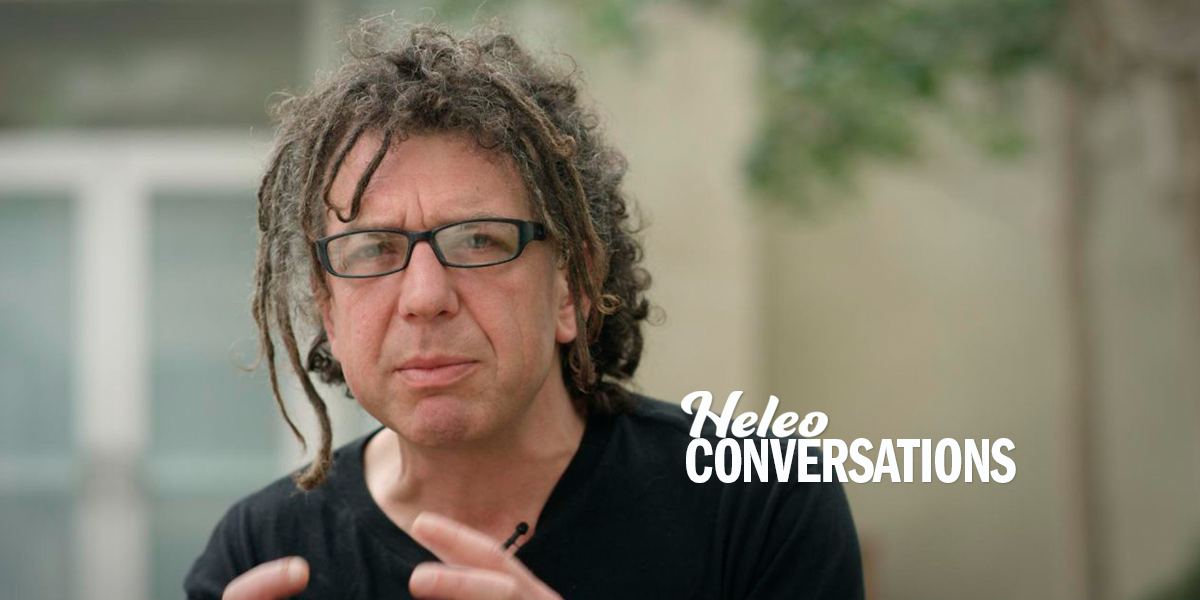The Olympics nearly disappeared forever. A grand spectacle in the ancient world, the games were snuffed out in the 4th century AD and only revived in 1896, after Baron Pierre de Coubertin founded the International Olympic Committee. Since then, they’ve expanded worldwide and produced enduring moments of national pride and individual triumph. Heleo’s Mandy Godwin recently got the chance to talk with David Goldblatt, author of The Games: A Global History of the Olympics, about the broader effects that the Olympics have on our world.
Mandy Godwin: What are the most common misconceptions people have about the difference between the ancient and modern games?
David Goldblatt: The first is that amateurism existed in any kind of meaningful form in the ancient world. Although there were no cash prizes at Olympia, there was a network of professional and semi-professional sport in ancient Greece with prizes and cash payments, none of which barred you from competing in Olympia. That certainly wasn’t the case for the 1896 games. Moreover, we know that a winner at Olympia would be parlayed into political power, a monetary reward, or some other kind of gain once you were back home.
The second misconception is that it had nothing to do with politics. It was an intensely religious, spiritual, and political occasion. When you walk into Olympia still, there are the remains of the Philippeion, which is the set of statues of Philip of Macedon and his wife, and his son Alexander the Great. All of whom won competitions at Olympia as the owners of chariots or horses. Political status was bargained and shown off and negotiated, it always has been in the games.
Mandy: Could you talk a little bit about de Coubertin [founder of the modern Olympics] and his vision? I was really struck by the concentric circle approach that he took to organizing. He almost seemed like a better organizer than idealist.
David: I mean, he was an idealist, but for a very particular and rather narrow ideal. The ideal of the Henley Regatta was not only a governance model of concentric circles: people who know what they’re doing, young folks being trained up, and useless but stardust-like characters on the outside. It was also a model of amateurism. Henley was part of the social round of the British aristocracy, alongside Wimbledon and balls. They were absolutely adamant that it would be an amateur event but what amateur meant was not merely that you would never receive money for rowing in a race, but whether you had ever been paid for manual labor. Amateurism, in that regard, was always full of class exclusion by the aristocracy wanting to demarcate their world of gentlemanly sport from the great unwashed masses.
That was what ruling-class white men of the late nineteenth century believed in the United States and in Britain. Their version of sport was an instrument of generating esprit de corps. Manly, Christian, muscular, morally minded bodies and spirit, ready to rule the empire. There were a lot of takers for that. No wonder he pulled it together. That’s his vision, as he says, “The Olympics should be a display of manly virtue for which the reward is the polite applause of women.”
Mandy: Seems a little anachronistic at this point.
David: It doesn’t really work, it’s not cutting a lot of ice in the twenty-first century, but in 1896 amongst his class it was all the rage.
Mandy: Do you think that it was more the push from outside forces like the Women’s Olympics that changed that, or just overall ideological shifts?
David: The Women’s Olympics, the women’s sporting movement, and women athletes and administrators — not just in the twenties when they were organizing the Women’s Olympics, but all through the twentieth century — have been pushing in different ways to be included and to insist on a different way of doing things. I think the challenge has come to the Olympics from other directions as well. They’ve had to make their peace with dealing with serious national governments. Not with some mayor in a city, but actually dealing with the Third Reich. That is cemented by the Olympics’ place in the Cold War, which provides the central narrative structure of the Olympics for twenty or thirty years. It’s had to accommodate.
“A certain amount of increasing costs and giganticism was coming, given that there are more nations, more sports.”
The Olympics is quite lithe, despite its conservatism. It made its peace in the 1990’s with commercialism, sponsors broadcasters, its own branding mechanisms and, of course, the abandonment of amateurism as an element of the Olympic charter. It saw off the Worker’s Movement, which back in the twenties and thirties, was actually quite a big deal and was offering a different kind of popular sporting spectacular and model of what sport was about.
Is it bigger ideological changes? Well, all of these things are part of bigger and wider political forces, be it decolonization or the Cold War or the commercialization of popular culture, and the Olympics has been lithe enough to roll with all of them.
Trending: Navy SEAL Secrets for High Performance Under Pressure
Whether it has turned out to be a good thing or not is sort of a moot point, but it’s definitely made its deal with the devil every time.
Mandy: I found it really interesting the way you characterized the Olympics as surmounting all of these external challenges and then itself becoming the problem. Do you feel like that was inevitable?
David: Well, nothing’s inevitable but look at the big charge. Look at the IOC [International Olympic Committee] itself. With very little knowledge or interest in the fine details of urban development, they established a one-size-fits-all, do-as-we-say, no-room-for-negotiation model of host-IOC relationships. A certain amount of increasing costs and giganticism was coming, given that there are more nations, more sports. Security costs post-9/11 is not really the IOC’s fault and that is part of it.
The success of all those things combined with the mad competitive bidding that went on based on the illusion of Barcelona. Barcelona has a lot to answer for, as the one Games which was successful in truly rebranding the city and generating some real economic change. But Barcelona is a complete exception because rather than being seven years in the making, it’s 17 years in the making, and the Olympics are not the catalyst but the crowning glory. It had Miró, Gaudi, and Picasso up its sleeve, which is not really what Atlanta had going for it.
Mandy: Not exactly.
David: After that, there has been a decision, I think rightly, to reflect the changing balance of economic and political power in the post-Cold War world by awarding the games to the global south. Particularly in the case of Beijing and Sochi, you’ve got some particularly serious political statements being made, which is part of the success of the Games. So many people watching. Nothing concentrates the global public’s otherwise rather fickle concentration, and NBC, advertisers, and the politburo of the Chinese Communist party all want a piece of the action.
“This time around, the conversation has changed, even in the mainstream coverage. BBC Sport, NBC Sport, which is usually an issue-free zone — everybody’s having to acknowledge the favelas.”
The IOC is just stoking the fires of all this and consistently turning a blind eye to the disastrous urban interventions that accompany the Games. It’s interesting. This time around, the conversation has changed, even in the mainstream coverage. BBC Sport, NBC Sport, which is usually an issue-free zone — everybody’s having to acknowledge the favelas. “Oh it’s a bit empty, a bit troubled, we hope the sport’s good enough to be payback for the misery of the people of Rio.” Plus the doping. The conversation has changed on that too.
What demonstrates that the Olympics is a problem is that fewer and fewer cities want to bid. The Winter Games 2022 is down to two bidders, three for 2020. LA is probably going to get the games again in 2024 but how many cities can say, “UCLA, you are the Olympic village.” It’s unrepeatable. That’s the problem. I also think allying the model of commercialized elite competitive sport to sport as an instrument of social policy brings its own problems. I do not buy that the Olympics inspires higher levels of participation. It inspires future Olympians. But if what you’re interested in is getting obese kids walking and old people cycling, which is really what you want if you want to do something about the health crisis, the Olympics is so not doing it.
London 2012 really tried, but less people are exercising in Britain than they were in 2012, which is mainly to do with the fact that there are more poor people due to the level of austerity, who now can’t afford to go swimming.
Mandy: Right, but that’s not as glamorous.
David: The mode of development accompanying the Games completely trashes all of the Olympic values and sustainability. I think there is a long slow crisis of ideological legitimacy. This is the first time there is a sense of unease about it in the mainstream.
Mandy: Do you feel like that sense of unease and the mainstreaming of being aware of the issues has to do with the fact that the scale has grown so much? With social media, there’s so many viewers now. There’s bound to be more people talking about the negative effects.
David: Social media helps. Brazil, for all its faults, is a democratic society in a way that Russia and China aren’t. In Vancouver, quite a lot of this was broadcast but it was the Winter Games in Canada and people just aren’t focused. But this is Brazil and the country is seriously in crisis, which focuses people. Also, Rio’s poverty is really hard to hide. Atlanta hid it by basically removing everybody from the center. Who went to the poor bits of Atlanta after that?
In Rio, bang, there it is. Interestingly I think the poor and the opposition forces of the favelas have found a much bigger voice this time around because with things like Rio on Watch, Catalytic Communities, there are instruments for really getting it out there that weren’t there before.
Trending: How to Make Menopause the Best Time of Your Life
Check all of the Brazil correspondents in the US and the UK. Everybody’s so on it, telling different kinds of stories. Again, that’s access. If you could’ve got to the hutongs that were being ripped down in China in 2007, that’s Brazil for you. Open.
Mandy: I know that you don’t recommend boycotts from viewers, but what do you think that an average viewer who is interested can do?
David: Read, first and foremost. Make up your own mind. I don’t have a monopoly of wisdom. I think it should be a politicized issue. Most people are not used to thinking about these things. They’re certainly not equipped with historical knowledge and comparison. So, first thing’s first, do a bit of reading. Tune into the voices of the people actually in Brazil and in Rio, and take it from there. I would be surprised if it didn’t make one feel uneasy.
“Politics is about dialogue and experimentation. Maybe if we have a conversation we’ll come up with something better.”
It’s interesting where we’re in a position as guided consumers, being offered boycott or not as the only options. Really? That’s the kind of politics we have to have? This really sucks, I don’t want to be offered such a bullshit choice. Politics is about dialogue and experimentation. Maybe if we have a conversation we’ll come up with something better.
You go to boycotts where the gauntlet’s been laid down, do this or X. What are we saying? “Be nice to poor people?” We have to be more specific. Do you know what I mean?
Mandy: Yeah.
David: Half the problem is that the IOC is autonomously sealed off from global citizens or indeed, national governments. Where are the points of pressure? This is a problem we all encountered last year watching FIFA destruct, going, “How could it be that these people are allowed to hold the world’s game in trust and nobody’s got any leverage over them?” There’s the problem. There’s a whole problem with the governance of sports — where is the point of pressure and how come these people managed to aggregate so much power with so little transparency and so little responsibility?
Mandy: It seems like an organization of power issue, a lack of accountability.
David: First and foremost, it’s a serious lack of transparency. With that comes the accountability. First, let’s know what’s going on. FIFA are still not publishing the wages, salaries of the President.
We need sports media that’s going to be brave enough to get on the case. Part of the problem is that the sports media, rightly, is looking after their interests, going, “I need access, I don’t want to rock the boat and I want to report on goals, not bribes.” They’re not even trained to do that anyway. Again, things are getting better and the best journalists, and the best newspapers in Britain, Germany, and the U.S. are leading the charge, but we need loads more of this and in other countries. Then people can start voicing their concerns, be involved in campaigns and find an outlet for their disquiet. There’s a few steps before we get to that.
Mandy: Do you feel like there is reason to hope that we are headed that direction, though?
David: “Pessimism of the intellect, optimism of the will,” as Antonio Gramsci, the imprisoned Italian communist leader, wrote. Are you familiar with that?
Mandy: Yeah. You’ve got to keep hopeful, despite all.
Trending: Microsoft, Google, and Beyond: What Business at the Cutting-Edge of AI Looks Like
David: Keep hopeful, what’s the other option? Once the American justice system gets its teeth into FIFA, and the Swiss legal system investigates the 2022 and 2018 World Cup bids, we’ll see. For the meantime, the same old dudes are in charge doing the same old thing, from what I can see. The jury’s out on FIFA, let alone the rest of them.
Mandy: What is it about the Olympics and football and also just sport in general, that has led you personally to believe in them so much? What is it about sport that you find incredibly worthwhile?
David: Well there are two levels to the answer to that question. Eduardo Galeano, the Uruguayan writer, in Football in Sun and Shadow tells a story where there are two teams in Montevideo: Peñarol, his team, and Nacional. Normally you would never celebrate a goal of your deadly enemy, but he sees a goal scored by Nacional and it’s so beautiful it makes him cheer. He realizes that, in the end, actually what he loves is great football. And he calls himself a beggar for great football wherever he goes.
I’m a beggar, too, but I’m a beggar for other people’s meanings about football. That is what really super-duper floats my boat. It doesn’t matter what I think and what I like. Who cares? One person among 7 billion. The point is 4 and a half billion really dig it.
“If comparative sociology is what floats your boat, which it certainly does mine, here is the most extraordinary universal, which is the same everywhere but completely different.”
If comparative sociology is what floats your boat, which it certainly does mine, here is the most extraordinary universal, which is the same everywhere but completely different. That’s really more intellectually stimulating than I know how to explain. Personally, I also really love crowds. I like being in noisy crowds. I don’t get claustrophobic. I can be in quite difficult or hostile situations and I quite like it. Again, if you’re a sociologist and you’re interested in the relationship between structuring human agency, and individual and collective action, there’s nothing like crowds. How is it that everybody in a football crowd suddenly knows it’s time to sing, “The referee’s a bastard?” Do you know what I mean?
Mandy: Yeah.
David: I don’t give a monkey’s butt about the winning and losing. I’m interested in narrative and ritual. That aspect of sports, particularly live. Television, less so. The ritual of watching it — out of which both solidarity and identity is generated — is, again, to the anthropologically inclined mind, pretty interesting. You don’t get a lot of that in industrialized societies.
Mandy: There’s such an energy to it. I can feel that… Is there anything you’d like to add about the Olympics?
David: I’m quite enjoying having virtually broken the Olympic record for talking to NPR. If they ever introduce the “commenting on the sociology of the Olympics” as an Olympic event…
Mandy: You’ll take gold?
David: There are others out there, but I’m definitely in with the chance. I’m Olympic standard.
This conversation has been edited and condensed.



























